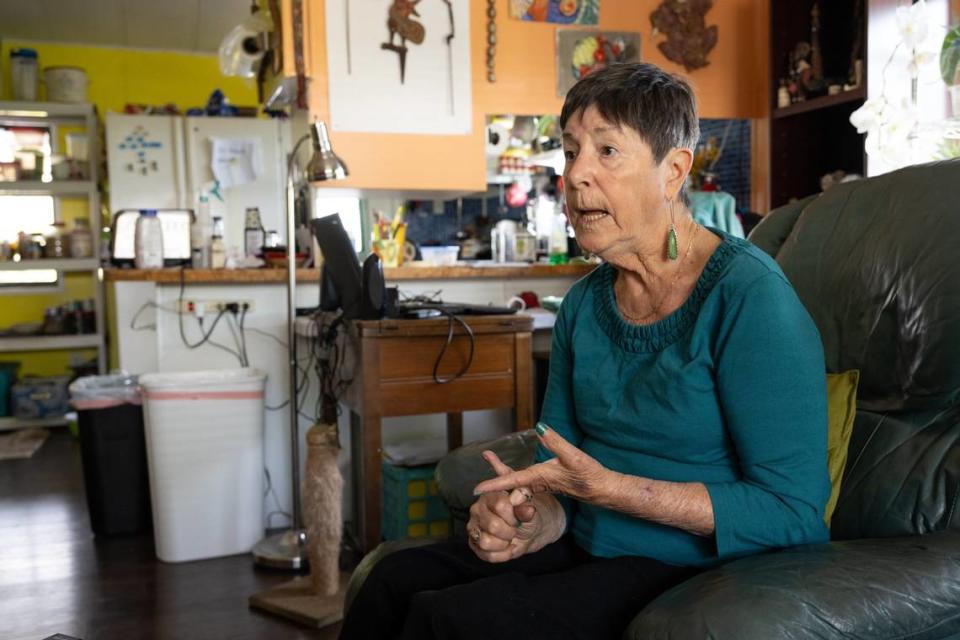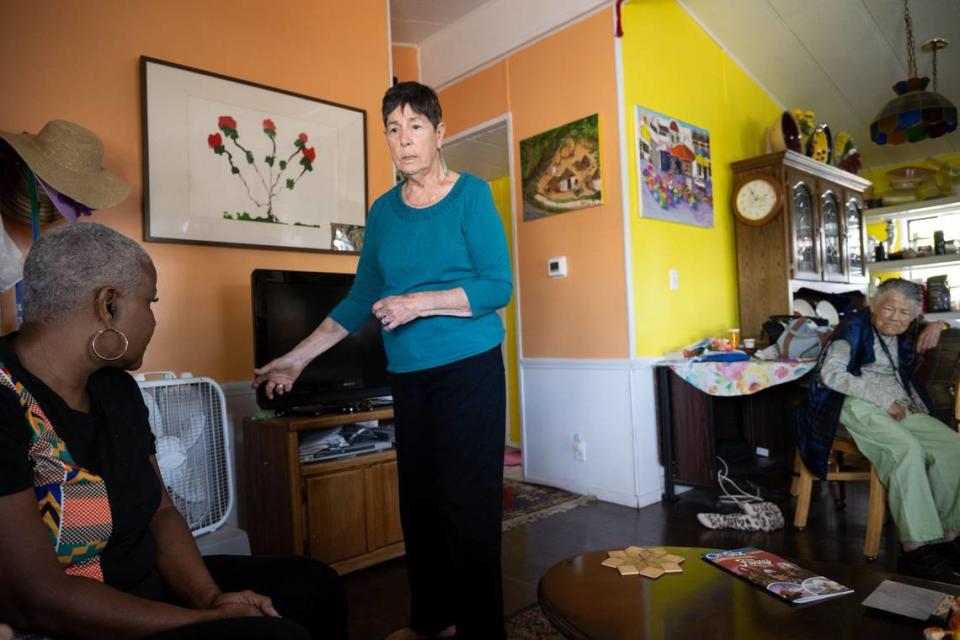She refused to pay a $500 fee to her landlord. Her Sacramento property manager called the cops
Carol Eckstrom dragged out a chair and staged a sit-in, just a few months after her stroke. In a way, she got what she asked for: The manager of her Sacramento mobile home park had finally hired contractors to fix the bulge in her walkway.
But it would cost her $500.
Eckstrom flatly disagreed that she should automatically have to pay $500 to her landlord to have the walkway fixed. She wanted time to find her own contractor. If sitting right on top of that trip hazard all day would stop the work from happening, that’s what she would do.
Eckstrom is 73, a retired accountant with a tidy white bob. A complaint form she copied and saved shows that she first told the park management office about the roots pushing up the walkway in front of her Capital Mobile Estates home on Sept. 2, 2022. For the nine months before her small act of protest, management took no action. After reporting the problem again April 2, with another written form, she said she got fed up and called the California Department of Housing and Community Development the next month.
On the Friday before Memorial Day, Eckstrom learned that the workers would come to address the problem the next day — and she would have to foot the bill.
The job didn’t seem like a $500 job to Eckstrom, and anyway, she thought she had the right to more time to negotiate with the landlord and to seek other bids. She said she told the park manager as much, but the manager, Lydia Mitchell, refused to delay the work, showing up that Saturday afternoon with contractors. There, they found Eckstrom and several friends sitting on top of the worksite in the wooden kitchen chairs she had wheeled outside on her walker early that morning.
Then, Eckstrom said, Mitchell summoned Sacramento police officers to the scene and threatened to evict her.
Eckstrom was so scared and overwhelmed that she started to cry.
Terrified that she would be evicted, Eckstrom agreed to pay the money and slowly shuffled inside. Soon after, she obtained the services of an attorney for the Golden State Manufactured-Home Owners League, who took over communications about the $500 and asserted that his client would not and should not pay that money.
Mitchell did not respond to a detailed summary of Eckstrom’s version of events, except to say, “I made the repair to the sidewalk, and as (a) courtesy I did not require Ms. Erickson (sic) to pay for the repairs or reimburse Capital Estates.”
Sitting in her dining area surrounded by panda collectibles, Eckstrom said Mitchell didn’t back down until the lawyer got involved.
“They railroaded me by coming to my house when I had recently had a stroke,” Eckstrom said. “She’s bullying me.”
Tenant protections
Eckstrom and other neighbors who have had run-ins with the property manager said their story illustrates the need for a tenant anti-harassment ordinance in Sacramento. The interactions range in severity from testy conversations to a restraining order case against a tenant in which the manager suggested an 82-year-old retired teacher, Maria Ruiz, was sent by the devil.
“She’s picking on a vulnerable community,” said Bobbyie Waters, who moved to the park in February. Many people who live in Capital Mobile Estates are seniors. “A lot of them are on limited income, they can’t get around. Some are very easily intimidated, or they just don’t have the energy to try to fight.”
But, Ruiz said, without a local anti-harassment ordinance, tenants can’t do much even if they find the energy to fight.
Though certain forms of tenant harassment are illegal under state law, they’re only illegal when the landlord acts with the intention of getting renters to move out. In court, proving that intent can be next to impossible.
Furthermore, landlords’ liability is capped at $2,000 per violation, making these cases unappealing for attorneys to pursue.
A proposal put forth by Caity Maple, who represents District 5 on the City Council, would create stronger tenant protections in the California capital.
Among other provisions, the local ordinance would allow tenants to recoup attorneys’ fees from a landlord in a successful suit. The proposal also says that landlords and their agents can’t harass tenants “in bad faith,” which goes beyond the state law’s stipulation that tenant harassment only exists when the landlord is seeking to make the tenant move.
That proposal will likely be re-heard by the council’s Law and Legislation Committee in August, Maple said; the committee’s members asked city staff for a detailed report on the current tenant resources in the city after hearing the proposal April 4.
“We know there are not nearly enough (options for tenants) considering that free legal services are overwhelmed, and the Renters Helpline was run by the now-defunct Sacramento Self-Help Housing,” Maple said in an email. “While I would prefer this policy to move forward more swiftly, I think it will help our case to know how little resources are actually available for renters in Sacramento.”
‘You can’t get evicted for this, Carol’
Eckstrom said she capitulated to Mitchell’s demands the day of her protest because she didn’t understand her rights in the moment. Like many of the residents in the park, she owns her mobile home but rents the land from Capital Mobile Estates, a gated park near Lemon Hill, and some tenant law applies to her situation. When Mitchell raised the possibility of an eviction, she panicked.
She said her friends, including Ruiz, were all talking over each other.
“The other people around me were saying ‘you can’t get evicted for this, Carol — it’s not an evictable offense,’” Eckstrom said. But Mitchell, she said, “was scaring the heck out of me.”
Before her stroke in January, Eckstrom was unflappable. Now, she said, she gets frazzled easily.
When Sacramento officers responded to the scene, they were, Eckstrom and Ruiz said, confused about why they had been called and not particularly knowledgeable about tenants’ rights. Eckstrom said the police encouraged her to pay the money to avoid “this hassle.”
In the end, she gave up and wheeled her walker back inside. “All these people are yelling at me what to do and what not to do,” she said. “And finally I just caved. I said, fine, I’ll pay the $500.”
She also knew how Mitchell had treated some of her neighbors in the park. The Sacramento Bee reported last September on the “culture of fear” that had overtaken Capital Mobile Estates after Mitchell was hired by the Beverly Hills-based landlord in mid-2021 and started handing out seven-day notices threatening eviction for minor rule violations, such as having a sun shade over a hot tub.
Since September, Ruiz said, the mood at the park has only worsened.
Ruiz was lying in a hospital bed in January, she said, when a man wearing an unconvincing disguise handed her a big envelope. He was a process server; the envelope contained a restraining order filed by Mitchell. Ruiz, then 82, skimmed the pages.
In the form, Mitchell said that she feared for her safety, and she feared for the safety of her three young daughters. She wrote, “Maria has said she is going to torment, annoy and harrase (sic) me all she wants and will make my life misrable (sic) because satan sent her to torment me.”

Ruiz is a retired teacher and the president of the park’s chapter of the Golden State Manufactured-Home Owners League. When she was served with the court papers, she said she was in the ICU recovering from a lung surgery. She considered the restraining order the latest development in a pattern of harassing behavior from Mitchell.
Mitchell denied that in an email: “I was in fear of my own personal safety,” she wrote, “and did not file the restraining order to harass any of the residents.”
Ultimately, court records show that Mitchell’s requests for restraining orders against Ruiz, another resident, Barbara Garnier, and Linda Larsen Nye, the state president of the Golden State Manufactured-Home Owners League, were all dismissed. The petitions were filed three days after the park’s chapter of the league, which organizes for mobile home owners’ rights, tried to meet in the park’s clubhouse on their regularly scheduled evening slot.
That night, as she wrote in her petition, Mitchell turned them away. At multiple points, the manager screamed at the residents in interactions that were caught on surveillance footage.
Mitchell submitted video surveillance to the court as part of her restraining order cases. One video directly contradicted her description of events in court documents.
Mitchell wrote in her petition that Barbara Garnier struggled with her to keep a sliding door in the clubhouse open, then shouted at Mitchell and bullied her and made as if to hit her.
Even though the video does show Garnier and Mitchell grabbing the sliding door at the same time from opposite sides, Garnier never shouts in the video, and she does not appear to threaten to hit Mitchell. The only person who appears ready to take a swing is Mitchell’s teenage daughter, who screams “don’t you put your hands on my mom” at Garnier and throws her hands in the older woman’s face.
Mitchell did not respond to The Bee’s questions about the discrepancies between the video evidence and her written account in the restraining order petition. She said, “Barbara Garnier and I have moved on to a new positive chapter.”

Tenant anti-harassment ordinance stirs up controversy
Existing state laws do little to protect tenants from harassment, said Ethan Silverstein, a staff attorney for the ACCE Institute who works on tenants’ rights cases.
“Tenants often find themselves with no one to contact to enforce this,” he said. “If the harassment is very bad, a tenant can call the police. … What we’re calling ‘hostile living environment’ harassment, things like, ‘Oh, the landlord’s refusing to take my rent,’ so on and so forth, there’s not really someone who enforces that. Landlords just kind of get away with it.”
California cities, including Richmond, Oakland and Los Angeles, already have tenant anti-harassment ordinances in place. Silverstein said they’re game-changers. In those cities, he said with a laugh, “It’s a lot easier to stop tenant harassment.”
Opponents of the ordinance who spoke at the Law and Legislation Committee hearing in April said it was “duplicative” and that it would introduce burdens to landlords, particularly mom-and-pop landlords. Some also said that it would enable tenants to harass building owners. One landlord who called in to comment said, “Why should the tenants be a protected class? There’s just as many bad tenants.”
But Silverstein said that attorneys generally start with a warning letter to the landlord informing them that their conduct is against the law.
“Warning the landlord about the law oftentimes changes behavior,” he said. “And if the landlords don’t change behavior and choose to proceed in bad faith, tenants have remedies.”
Ruiz said that with the current state of tenant protections in the capital, she has no real options. She can’t afford a tenants’ rights attorney on her fixed income, and the city and county have meager resources for residents who want to hold a landlord accountable. She doesn’t want to move out of the home she and her husband, Ted Druch, have grown to love.
She’s watched as the clubhouse that used to bustle with pinochle games and kaffeeklatsches has emptied. She said people don’t feel comfortable there anymore.
Some people sold their homes and left the park entirely. Mitchell suggested that tack to an elderly resident in one surveillance video.
In the video, the manager shouted at the elderly woman that she needed to respect the rules.
“And if you don’t like it,” Mitchell says, “you can sell your home and move out.”

